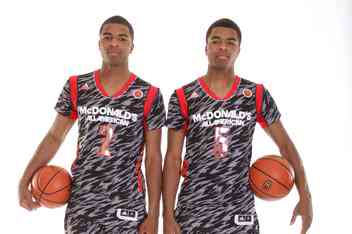Double Your Pleasure, Double Your Fun – Are Package Deals With Top Recruits Just The Flavor Of The Day Or Are They Here To Stay?
Posted by BHayes on September 25th, 2013Bennet Hayes is an RTC columnist. He can be reached @HoopsTraveler.
With the recent news of a potential Cliff Alexander–Jaquan Lyle package deal, can we officially label the recruiting season of 2013 as the summer of bromance? An Alexander-Lyle pairing would mark the second duo of top-25 recruits in the class of 2014 to make the college decision a joint one, as Jahlil Okafor and Tyus Jones (both top-five recruits according to a number of outlets) have long marketed themselves as a package deal for college recruiters. We may not be witnessing Bigfoot here – package deals like this have certainly gone down in the past – but are these examples proof of an emerging trend? The most frequent iteration of the phenomenon in years past had to be the brother package – see Harrison, Andrew and Aaron (Kentucky) or Barton, Will and Antonio (Memphis) – or if we were stretching, close friends who either grew up together or played their high school ball with one another. But now we are beginning to push the definition of proximity even further, as high school basketball players from completely different parts of the country are forming relationships strong enough to consummate these package recruitment deals. It’s a testament to the growing reach of the AAU circuit, the increased facility of long-distance communication in today’s world, and last, but not least, an eerie imitation of the current dynamics within NBA free agency – the professional equivalent of the recruitment process.

Kentucky Has A More Common Version Of The Package Deal Arriving On Campus This Fall In the Harrison Brothers –Emphasis On Brothers
The modern high-major college recruit simply isn’t afforded the same summer vacation he used to have. Even a decade ago, there simply were not as many mandatory (in the sense that every other high-level recruit will be there) camps, AAU tournaments, and international competitions as there are today. We could spend a lot of time discussing the many negatives of this current grassroots setup, but one positive to grow out of the arrangement is that recruits have the chance to spend more time with their peers from across the country. Especially for kids not playing their high school ball at the hoop factories (Findlay, Oak Hill, Huntington, etc.), I would imagine finding peers in your native surroundings can be a challenge, so having the chance to spend time with those facing the exact same circumstances as you has to be a welcomed opportunity for these star recruits.
Summer friendships are a familiar concept not only for five-star basketball recruits, but also middle and high school aged kids who head off to summer camp each June and July. If you were one of those kids ten or twenty years ago, you can attest to the difficulty of keeping in touch with your camp friend from three states over once camp ended. Before the advent of the Internet, e-mail, smart phones, and texting those relationships were left to rot during the nine months of the year you were not at camp. No longer, however. AAU competitors, USA basketball teammates, and even fellow campers can now stay in touch throughout the year, cultivating friendships formed over the summer. The growth of these friendships is what makes the Okafor/Jones and Alexander/Lyle type package deals a far more reasonable proposition.
Well before King James took his talents to Miami, or Dwight Howard yearned to pair with Chris Paul, heck – even years ahead of the Boston Celtics forming the Big Three, high school superstars have actively chosen to combine forces at the college level. After all, if you really want to win, why not bring your best high school competition with you? But even so, there can be no mistaking that the recent rise of the recruiting package deal has directly followed the Big Three (or Big Two) obsession that has consumed today’s NBA. NBA stars like James are undoubtedly role models and idols for even the brightest of high school stars, so when they use whatever means possible to land themselves alongside fellow members of the NBA illuminati, it only stands to reason that their high school admirers (and counterparts) would attempt to imitate that sort of talent hoarding at the college level. And given the success of the Heat, this is a fad that seems a long ways away from going out of style at the NBA level, which, at least in theory, should mean we will continue to see more superstar packages in the college game. Okafor, Jones, Alexander, and Lyle all have far too much of their narratives left to write for this to be registered as a definite trend – let’s officially get each pair to the same school to begin with – but it’s no stretch to believe that we may look back at the summer of 2013 (and the High School class of 2014) as one that began a remake of the recruiting process.











































